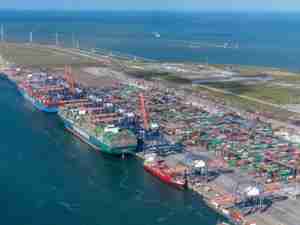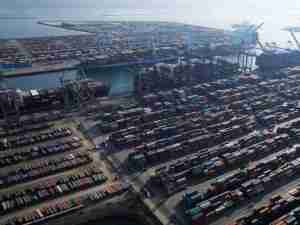Thousands of protesters marched on ports from California to Alaska in rallies seen as a test of the Occupy movement's momentum, hoping to draw attention to economic inequality and a financial system they say is unfairly skewed toward the wealthy.
Demonstrators succeeded in disrupting arrivals of trucks and dockworkers at some waterfronts along the coast, effectively closing two terminals in Oregon and third in Washington state and disrupting port operations in Oakland.
"Whose ports? Our ports!" a crowd of around 1,000 activists chanted in Oakland, long an Occupy hot spot, as they paraded before dawn from a transit station to the city's cargo port and split into groups to try to block terminal entrances.
The long-planned action comes after the Occupy movement that began in New York in September has seen its tent camps in most big West Coast cities dismantled in police raids, leaving the movement looking to regain its footing.
But by dark, demonstrators had largely failed to cause the large-scale halt to West Coast commerce some had sought, and several dozen protesters had been arrested along the coast.
The largest rallies unfolded in Oakland, where protesters had hoped to stage a repeat of a previous protest that briefly succeeded in shuttering its port, the nation's fifth busiest container port by volume.
Oakland Mayor Jean Quan said the port protest, far from helping the working class, was actually harming her city and workers. By Monday evening, police said about 500 protesters were still standing on a road used by trucks at the port.
"People have to think about the consequences of the shutdown," Quan told reporters. "I think the ruling class is laughing right now."
Throughout the day, operations at several of the Port of Oakland's seven terminals were disrupted and delayed, and a few terminals closed early, the facility said in a statement.
Injured Vet Leads Oakland March
Former Marine Scott Olsen, whose injury during clashes between Oakland police and demonstrators in October gave fresh impetus to protests, led a march in Oakland.
Occupy Oakland spokesman Mike King called the blockade a success, saying cargo traffic at the port was limited to just two vessels in anticipation of the demonstration, and that longshoremen and Teamsters were largely absent from work.
"Nobody crossed the picket line, and most truckers stayed away," King said, adding that the only cargo loaded onto trucks in the terminal yards was material already taken off ships.
The port's executive director, Omar Benjamin, acknowledged "sporadic disruptions" but insisted the facility has remained operational.
Workers affected by the protests are divided.
"It's not good for the economy," said Agustin Luna, 39, an independent trucker waiting in his big rig to deliver a load of alfalfa to a ship in Oakland bound for Japan.
But Sean Martin, another independent trucker waiting outside an Oakland terminal, said: "I support what they are trying to do. Wages have steadily dropped."
At the Port of Long Beach, adjacent to Los Angeles, some 250 to 300 people rallied in the rain at a terminal facility where they scuffled with helmeted police officers who shoved them back with batons in an effort to keep the entryway clear.
Two were arrested before demonstrators left the area to block traffic along a thoroughfare through the port. But protesters later began to disperse on their own as rains grew heavier and police converged in force.
In San Diego, four people were arrested at that city's port as demonstrators tried to block a road into the facility.
Arrests in Washington State
Police in Seattle said they made 11 arrests at a port protest after demonstrators threw burning flares, bags of bricks and metal bars. One officer was struck in the face with a bag of paint, police s










